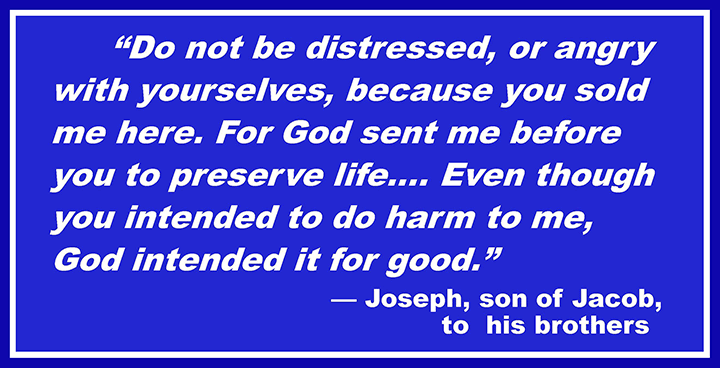
Right place, time and attitudeCOFFEE WITH WARREN, with Warren Harbeck |

|
One of my favourite Bible stories is that of Joseph, son of Jacob (a.k.a. Israel) and great-grandson of Patriarch Abraham (Genesis 37 and 39–50). Joseph found himself repeatedly in distressing circumstances, victim of malice! But that allowed him to be at the right place at the right time with the right attitude to be God’s agent of hope for others. Jacob doted on his teenaged son, even giving him a coat of many colours, which didn’t make him too popular with his 10 older brothers. One day Joseph told his brothers about a dream he had in which they bowed down to him. They wanted to kill him. When Joseph showed up while they were tending their father’s livestock, they saw their chance and said, “Come now, let us kill him and throw him into one of the pits.” Joseph’s life was spared at the last minute only because Judah, one of his brothers, made a deal with some Egypt-bound traders to buy him as a slave. Life in Egypt for the Hebrew slave had its ups and downs. Sold to Pharaoh’s captain of the guard, he excelled in his service and was placed in charge of all his master’s interests, only to be thrown into prison because his master’s wife falsely accused him of sexual assault. In prison, he was put in charge of the other prisoners. One of them, the royal cupbearer, had fallen out of favour with Pharaoh. He had a dream and asked Joseph for an interpretation. Joseph told him the dream meant the cupbearer would get his old job back. In return, the cupbearer promised to put in a good word for Joseph. Joseph’s interpretation came true, but the cupbearer forgot his part of the bargain until two years later, when Pharaoh himself had a dream. Pharaoh summoned Joseph from prison, and Joseph told him the meaning of the dream: that there would be seven years of plentiful harvest followed by seven years of famine throughout the region, and Pharaoh must appoint someone to oversee grain storage and distribution. Pharaoh elevated slave Joseph himself to the second highest position in the land. Two years into the famine, 10 brothers from the land of Canaan arrived at Joseph’s doorstep, hoping to purchase grain. Joseph recognized them, but they didn’t recognize him. After enquiring about their family back home, he sent them away with grain – and with the first of a series of tricks that eventually forced them to return to Egypt with their youngest brother, Benjamin, their father’s pride and joy, whom Joseph threatened to keep in Egypt as a slave. At this point Judah, the brother who had negotiated Joseph’s sale into slavery, stepped forward and pled with Joseph for Benjamin’s release, offering himself as a slave instead. So touched was Joseph by Judah’s change of heart that he announced to his brothers, “I am Joseph.” His brothers shook with fear, thinking payback time had come. But Joseph said: “Do not be distressed, or angry with yourselves, because you sold me here. For God sent me before you to preserve life.… Even though you intended to do harm to me, God intended it for good.… So have no fear; I myself will provide for you and your little ones.” Thus, by God’s providence, the children of Israel found refuge from famine and a home-away-from-home for the next 400 years. Yes, Joseph had often found himself in distressing circumstances, the victim of others’ malice. But that had allowed him to be in the right place at the right time with the right attitude to be God’s agent of hope for his tormenters – an example for us when, by God’s providence we, too, are called upon to be agents of hope for others, even our enemies.
© 2023 Warren Harbeck |